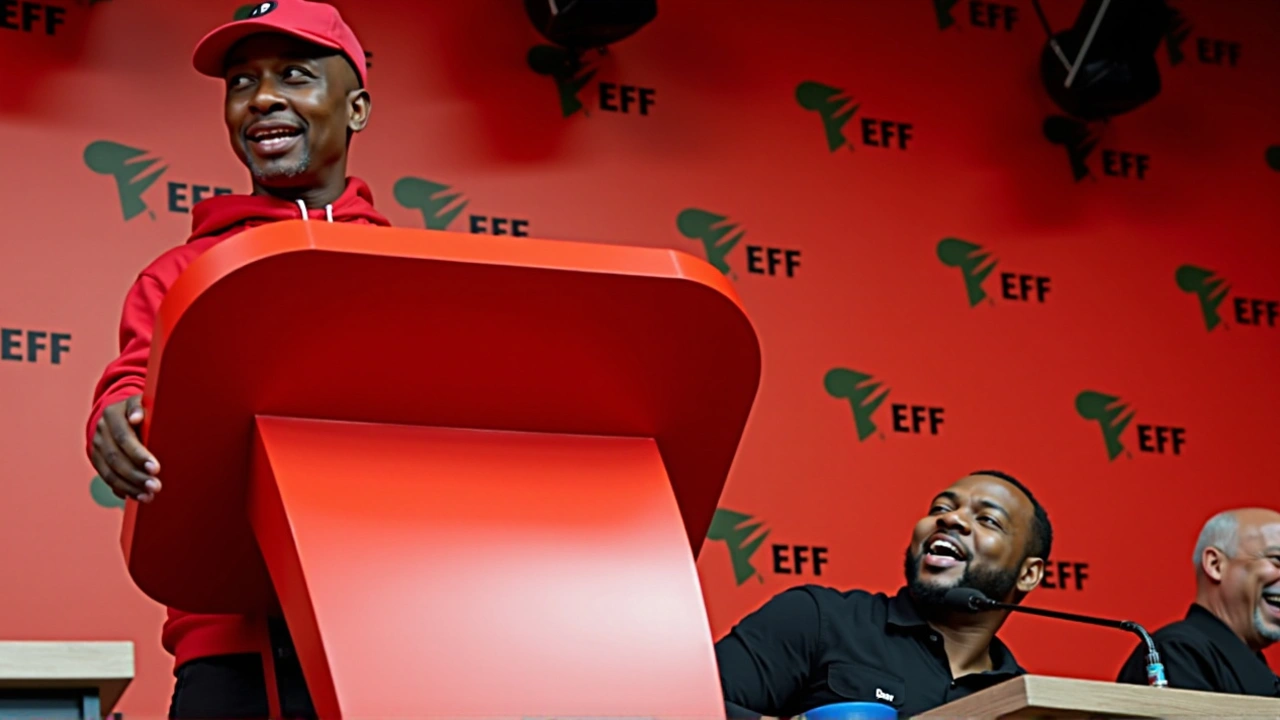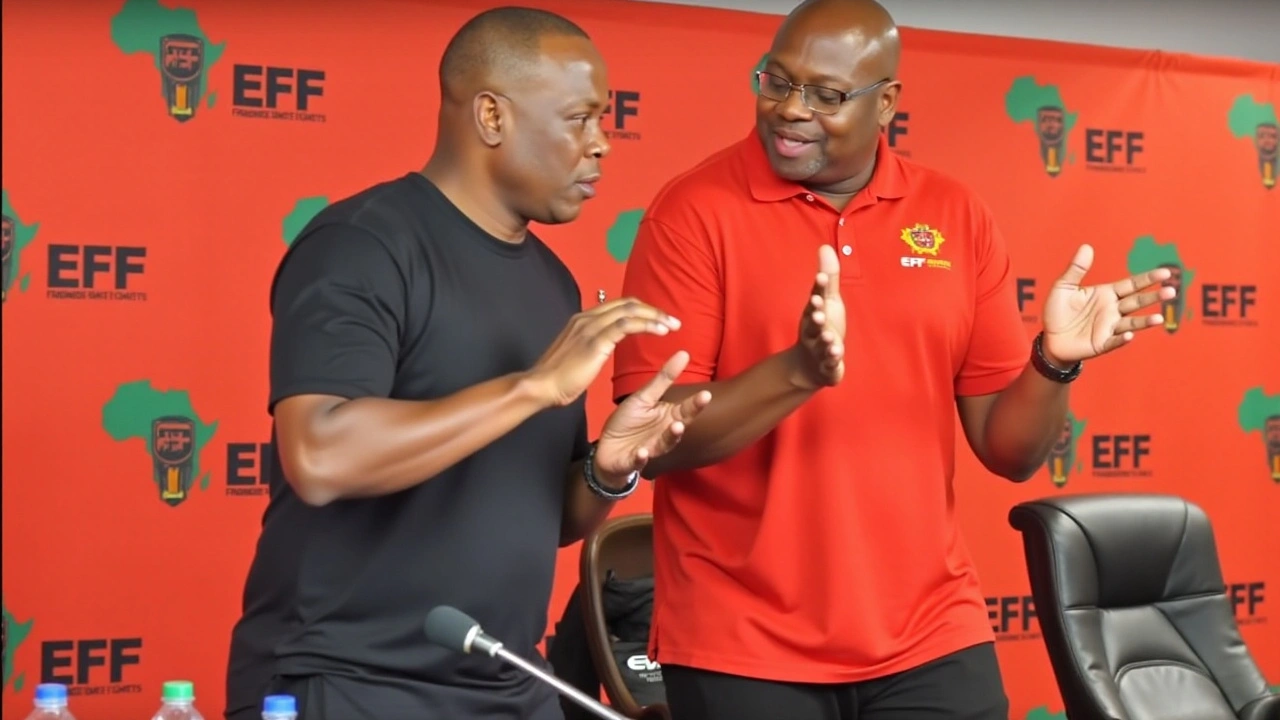Introduction
In a move that has sent shockwaves through South African political circles, Floyd Shivambu, a senior member of the Economic Freedom Fighters (EFF), has defected to the uMkhonto we Sizwe Military Veterans Association (MKMVA), which is commonly known as the MK Party. This realignment in political allegiance is not just a change in party membership but a significant event that could potentially redefine the political landscape in South Africa.
Who is Floyd Shivambu?
Floyd Shivambu has long been a towering figure in South African politics, particularly within the EFF. As the former chief whip and a close ally of EFF leader Julius Malema, Shivambu played a pivotal role in shaping the party's direction and strategies. Known for his fiery rhetoric and strong stance on issues such as economic freedom and anti-corruption, Shivambu has been a key player in the EFF's rise to prominence. His departure, therefore, marks a significant shift not only in his career but also in the dynamics within the EFF.
Why the Move?
The reasons behind Shivambu's defection are multifaceted. On the one hand, there have been whispers of internal conflicts within the EFF. Tensions between Shivambu and other party members, including Malema, may have played a part in his decision to leave. Shivambu's personal ambitions could also be a driving factor. Joining the MK Party might offer him new opportunities and a platform to pursue his political goals more effectively. Additionally, the ideological alignment between Shivambu's views and the principles of the MK Party could have influenced his decision.

Impact on the EFF
The EFF is likely to feel the impact of Shivambu's departure keenly. As a key figure in the party, his loss is a blow to the EFF's leadership and strategic capabilities. The party will need to find someone to fill the significant gap left by Shivambu's exit, which could lead to internal restructuring and potential instability. Moreover, Shivambu's departure could lead to a loss of support among EFF members and voters who aligned with his views and leadership style.
Implications for the MK Party
For the MK Party, Shivambu's defection is a considerable gain. Having a high-profile and experienced politician like Shivambu on board strengthens the party's position and visibility. It could also attract new supporters who admire Shivambu and are disillusioned with the EFF. However, integrating a figure like Shivambu into the MK Party could also pose challenges, particularly if there are ideological differences or power struggles.
Public Reaction
The public reaction to Shivambu's defection has been mixed. Supporters laud his decision as a bold and necessary move, praising his courage in standing by his principles. Detractors, on the other hand, view his defection as a betrayal, questioning his loyalty and integrity. The debate within the public sphere mirrors the broader political tensions and divisions within South Africa, highlighting the deep-rooted issues that continue to shape the country's political landscape. Social media platforms are abuzz with discussions, memes, and debates, reflecting the highly charged nature of this development.

Historical Context
To understand the full implications of Shivambu's defection, it's essential to consider the historical context. The EFF, founded by Malema in 2013, emerged as a radical alternative to the African National Congress (ANC), advocating for economic freedom and social justice. The MK Party, on the other hand, has roots in the ANC's military wing, with a focus on veterans' rights and social issues. The historical tensions and alliances between these parties and their predecessors provide a backdrop to Shivambu's decision, adding layers of complexity to the current political scenario.
Future Scenarios
The long-term implications of Shivambu's move are still unfolding. For the EFF, this could be a wake-up call, prompting introspection and potential reforms to address internal conflicts and solidify their position. The MK Party could leverage Shivambu's experience and popularity to gain ground in upcoming elections and political campaigns. However, the success of this strategy will depend on how well Shivambu and the MK Party can align their visions and goals.
Conclusion
Floyd Shivambu's defection to the MK Party is a significant development in South African politics with far-reaching implications. It highlights the shifting dynamics within major political parties and raises questions about leadership, loyalty, and political strategy. As the situation continues to evolve, the responses from the EFF, the MK Party, and the South African electorate will shape the future of the country's political landscape. Only time will tell whether this move will lead to new opportunities or further complications, but one thing is certain: South African politics will never be quite the same.

christine mae cotejo
August 16, 2024 AT 20:08Floyd Shivambu's dramatic departure from the EFF to the MK Party is more than just a headline; it is a seismic shift that reverberates through the very foundations of South African politics. The sheer audacity of a senior whip abandoning the party he helped build raises questions about internal cohesion and strategic direction within the EFF. Historically, the EFF has prided itself on its radical, unapologetic stance, and Shivambu's exit threatens to erode that image, potentially opening a vacuum for rival factions. Moreover, his alignment with the MK Party, a group rooted in veteran activism, suggests a deliberate pivot toward a platform that emphasizes historical legitimacy over raw populism. This move could attract voters disillusioned with the EFF's confrontational tactics, yet it also risks alienating the grassroots base that cherishes the party's fiery rhetoric. The implications for policy are profound; a Shivambu-influenced MK Party might champion a hybrid agenda that blends economic redistribution with veteran welfare programs. Internally, the EFF will now grapple with redistributing Shivambu's responsibilities, which were integral to parliamentary strategy and media outreach. The leadership vacuum may spark a power struggle, as emerging figures vie for prominence, potentially destabilizing the party's unified front. Conversely, the MK Party stands to gain a seasoned strategist, someone capable of navigating the treacherous waters of coalition politics and electoral campaigning.
However, integrating a high-profile politician is never seamless; ideological nuances and personal ambitions could clash, leading to factional infighting. Shivambu's reputation for fiery discourse may clash with the MK Party's more measured, heritage-driven narrative, creating a tug-of-war over messaging. The electorate will be watching closely, evaluating whether this realignment translates into tangible policy shifts or remains a symbolic gesture. In the broader context, this defection underscores a growing fluidity in South Africa's political landscape, where loyalty is increasingly contingent on perceived opportunity rather than ideological fidelity. As the media dissect each nuance, the real test will be how both parties adapt their strategies to either capitalize on or mitigate the fallout. Ultimately, this episode may serve as a catalyst for introspection within the EFF, prompting reforms that address internal dissent while challenging the MK Party to leverage Shivambu's expertise without compromising its core values.
Douglas Gnesda
August 16, 2024 AT 22:54From a strategic perspective, Shivambu's migration can be interpreted as a calculated realignment aimed at optimizing his political capital within a framework that offers greater institutional continuity. The MK Party's legacy as an offshoot of the ANC's armed wing provides a veneer of historical legitimacy that could complement Shivambu's personal brand of economic radicalism. By embedding himself in a party that balances veteran advocacy with progressive socioeconomic policies, he may be positioning himself to attract a broader coalition of voters who are both nostalgic for liberation credentials and eager for transformative reform. This synthesis of heritage and futurism could potentially recalibrate the electoral calculus, especially in constituencies where the EFF's confrontational tactics have plateaued. Moreover, the cross-pollination of ideas between the EFF's grassroots mobilization expertise and the MK Party's institutional networks could yield a synergistic platform that outmaneuvers both traditional opposition and nascent challengers. Nonetheless, the integration process will demand meticulous negotiation to harmonize divergent policy priorities and mitigate any encroachment on existing party hierarchies.
Abhijit Pimpale
August 17, 2024 AT 01:41Shivambu's exit underscores the fragility of charismatic leadership within populist movements.
Eric DE FONDAUMIERE
August 17, 2024 AT 04:28Yo, this defection could totally shake up coalition talks – it’s like adding a turbo boost to the MK Party’s engine, but watch out for the overheating!
Pauline Herrin
August 17, 2024 AT 07:14While the political maneuvering appears opportunistic, it is imperative to critically assess whether such a transition aligns with the core ideological tenets of both entities, lest it devolve into mere spectacle devoid of substantive policy advancement.
pradeep kumar
August 17, 2024 AT 10:01This is a blatant power grab.